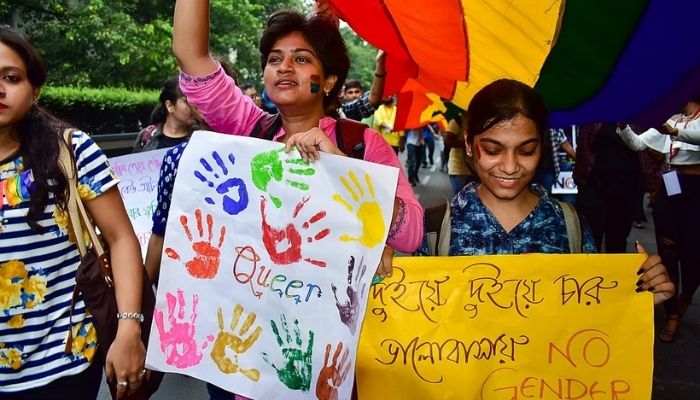Calcutta HC: Sexual Harassment Complaints Against Same Gender Maintainable Under POSH

Written by: Avanti Deshpande
A recent judgement by the Calcutta High Court could trigger a conversation on the need for gender-neutral laws on sexual harassment and assault in India. Under the POSH Act, the law is gender-specific in nature, and provides legal recourse for only women. The Calcutta High Court while hearing a case of sexual harassment held that complaints of sexual harassment filed by individuals against persons of the same gender will be accepted under the POSH Act.
The High Court’s View
Section 2(m) of the POSH Act defines a respondent as a person against whom the aggrieved woman has made a complaint. The Calcutta High Court noted (in the case of Dr. Malabika Bhattacharjee v Internal Complaints Committee, Vivekananda College and Ors.) that, the term respondent connotes a person and can be extended to mean persons of all genders.
The Calcutta High Court held that,
“Sexual harassment, as contemplated in the 2013 Act, thus, has to pertain to the dignity of a person, which relates to her/his gender and sexuality; which does not mean that any person of the same gender cannot hurt the modesty or dignity as envisaged by the 2013 Act. A person of any gender may feel threatened and sexually harassed when her/his modesty or dignity as a member of the said gender is offended by any of the acts, as contemplated in Section 2(n), irrespective of the sexuality and gender of the perpetrator of the act.”
Although the Court stated that there was some substance in the petitioner’s argument that the term respondent must be read in line with the statute as a whole, the Court noted that there was nothing to exclude a same-gender complaint under the POSH Act.
It’s important to note that the Court said that sexual harassment is not a static concept and needs to be interpreted keeping the current social context in mind.
Furthermore, as men are excluded or not seen as they could be aggrieved under the POSH Act, there is no legal recourse if they’re sexually harassed at a workplace. This judgement is a hopeful sign that the judiciary is starting to move away from the deep-rooted heteronormativity (to see the world as predominantly comprised of heterosexual people, in heterosexual relationships) and could start the much needed conversation about making gender-neutral laws on sexual harassment, rape and gender-based violence.
UGC Regulations 2016
The Calcutta High Court in its judgement referred to the University Grants Commission’s (UGC) new Regulations [University Grants Commission (Prevention, prohibition and redressal of sexual harassment of women employees and students in higher educational institutions) Regulations, 2015] that were notified in 2016. These regulations are gender neutral – making it possible for male and trans students to file sexual harassment complaints as well.
As per regulation 3(1)(d) states that, it is the responsibility of higher educational institutions to “act decisively against all gender based violence perpetrated against employees and students of all sexes recognising that primarily women employees and students and some male students and students of the third gender are vulnerable to many forms of sexual harassment and humiliation and exploitation.”
In contrast to the POSH Act which only defines an “aggrieved woman”, the Regulations provide for an “aggrieved person” (Regulation 7) who can make a complaint against sexual harassment. The Regulations are therefore inclusive and provide protection to all persons irrespective of their gender.
Need For Change
In India, the issue of gender neutrality in rape law was first raised in Sudesh Jhaku v. K.C.Jhaku and Others 1998 CriLJ 2428, where the Court expressed its opinion on the issue of gender neutrality of rape and sexual assault laws by quoting from an article, that said:
“Men who are sexually assaulted shall have the same protection as female victims, and women who sexually assault men or other women should be liable for conviction as conventional rapists. Considering rape as a sexual assault rather than as a special crime against women might do much to place rape law in a healthier perspective and to reduce the mythical elements that have tended to make rape laws a means of reinforcing the status of women as sexual possessions.”



The Parliamentary Standing Committee Report on the Protection of Women against Sexual Harassment at Workplace Bill, 2010 discussed the provisions of the Bill in great detail, including the question of gender neutrality of the law. The report outlines that during the consultation process, concerns regarding gender neutrality were raised (albeit by men’s right activists) on grounds that it’s incorrect to assume that only women can be victims of sexual harassment and employers have a duty to provide a safe working environment to all employees.
The Committee, in turn noted the objections to the gender-specific nature of the legislation but pointed out that women are disproportionately affected by incidents of sexual harassment at workplaces and gender-based violence, in general, and it’s imperative that gender-specific legislation granting protection to women be enacted.
With respect to gender neutrality, the Justice Verma Committee Report, 2013 took a more progressive approach by recommending that rape and sexual assault laws be made gender neutral from the (victim’s side only).
Unfortunately, these recommendations were disregarded by the Legislature and were not incorporated into the Criminal Law (Amendment) Act, 2013. The Report (Part II – Recommendations) clearly stated that as there was the possibility of sexual assault on men, as well as homosexual, transgender and transsexual rape, was a reality, the provisions had to be cognizant of the same. In this vein, in discussions of making sexual assault and rape laws to be gender inclusive, it is important to include sexual harassment laws and policies as well.
LGBTQ+ Exclusion
The Calcutta HC judgement is significant as the POSH Act has been criticised for excluding members of the LGBTQ+ community from the purview of the legislation, and implicitly upholding heteronormative standards. As long as the wording in sexual harassment laws remains as “man” or “woman”, it reflects, a decidedly binary understanding of sexual harassment and sexual violence overall. This leads to the clear exclusion of the LGBTQ+ community.
The failure of the legal process to acknowledge sexual violence and harassment beyond the male-female binary may have directly contributed to male and transgender victimization. The lack of statistics on the subject is a reflection of the existing attitudes towards the issue.



Lack Of Statistical Evidence
In People v. Liberta, a Court of Appeals of New York stated that,
“while forcible sexual assaults by females upon males are undoubtedly less common than those by males upon females this numerical disparity cannot by itself make while forcible sexual assaults by females upon males are undoubtedly less common than those by males upon females this numerical disparity cannot by itself make it permissible for the state to punish only men who commit, for example, robbery.”
As per Centre for Civil Society, 18% of adult Indian men reported being coerced or forced into sex. While we certainly need more data on this issue, in the context of sexual harassment at workplaces, just because the number of victims is deemed to be smaller is neither a sufficient nor a justified reason to exclude such a class of victims from the purview of the law and essentially leave them without a recourse to justice.
Conclusion
The recent Calcutta High Court judgement and the UGC Guidelines are progressive steps forward as all workplaces must be safe and inclusive spaces for all people. Laws on sexual violence, including sexual harassment, sexual assault and rape need to be changed to include all persons within their ambit and not restrict their applicability solely on the basis of gender.
To start with, changing the law on sexual harassment at workplace might be a good place to start, as it will acknowledge and provide a remedy to any person experiencing sexual harassment at work and make workspaces free from hostility for persons of all genders.
About the author: Avanti Deshpande is a penultimate year law student at ILS Law College, Pune. Her main interest areas are human rights, gender laws and international law.
Images have been used for representational purposes only. Credits: ILO Asia Pacific/Flickr
Ungender Insights is the product of our learning from advisory work at Ungender. Our team specializes in advising workplaces on workplace diversity and inclusion. Write to us at contact@ungender.in to understand how we can partner with your organization to build a more inclusive workplace.
Read our insights about diversity, legal updates and industry knowledge on workplace inclusion at Ungender Insights. Visit our Blog.
Sign up to stay up-to-date with our free e-mail newsletter.
The above insights are a product of our learning from our advisory work at Ungender. Our Team specialises in advising workplaces on gender centric laws.
or email us at contact@ungender.in




